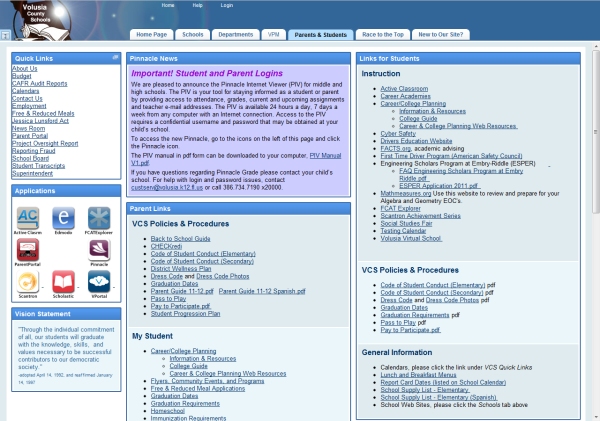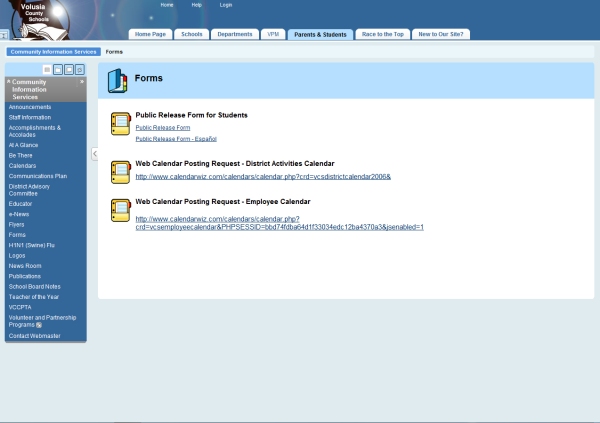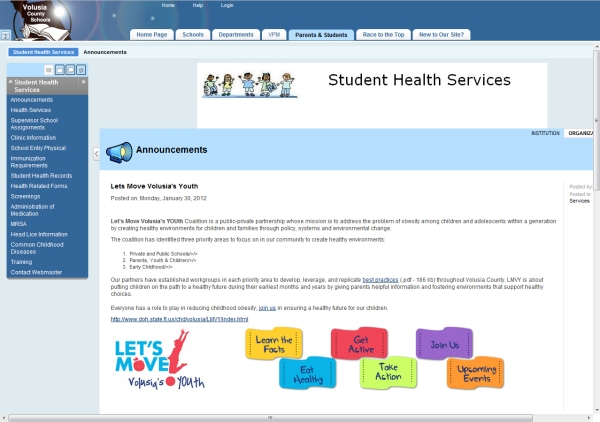POP of Medical Mojave recently posted a link about a student in Florida who was denied treatment during an asthma attack at school. I’ve read over a few news stories about it and it seems the school’s defense of first confiscating then denying access to the student’s inhaler was that the student’s parents had not signed a form. One of the articles I read reported that “The school district said they encourage all parents to make sure they file the proper paperwork each year.” Ok, so I took a little trip to the school district’s website and thought “let’s say I’m a parent with a student who has a medical condition requiring medication” and looked to see if I could locate the appropriate paperwork and the policy for medication in school. It turns out you can do it but not without a lot of digging. First, you have to go to the Parents and Students tab

Parents & Students tab
But it’s not under the heading of “Parent Links” which advertises policies and procedures and has various documents associated with it, like this one, titled “parent guide 11-12”, or the various documents linked under “Back to school guide“. Not in the District Wellness Plan. Silly me, I always forget that “wellness” is only for healthy people, not for us rejects with chronic medical problems.
Once I clicked on back to school guide, I was taken to a page with a new set of sidebar links and one of them says “forms”, maybe it’s there!

Forms link
Oh, no. It’s not. So back to the Parents and Students main page I go. I scroll down…Under the “My Student” header, I see “Student Health Services“. Surely this will get me to a place where the school district has made clear or at least mentioned their policy and has posted obvious links to the yearly forms that parents need to complete, sign, and place on their child’s file at school. Well, immediately below is another screenshot of that page, and while that very important information is not directly on this main Student health services page, I am happy to say that any parent of a student needing medication is now only one click away from the policy* and two clicks from that all important form**! Let’s see how long it takes you to find it, starting from the Student Health Services page itself.

Student Health Services
If you give up, here are the links and how one would get to them:
- *Administration of Medication, on side bar. Oh, on the page that describes their policy, there is no link to the form. If you want the form, you have to…
- ** click on “Health Related Forms” in the side bar, then click on the link to the “Authorization to Administer Medication” form and congratulations, you have found it. Now you just need to fill it out, have the doctor fill it out, and return it. Once, right? No? Yearly? That’s what the news stories said, but you know, I just don’t see that information on this form, so it must say that over on the “Administration of Medication” policy page. Um….although I zoomed in to blow up the itsy bitsy font they used for the policy, I do not see that it actually spells that out.
Too much? Well, I’ve got some time on my hands. My husband is off visiting relatives in NY and the temperature is moving into levels that will make me sick if I try to go out and do much of anything. And I guess the story of someone in distress while the people who are supposed to help – whose job it is to help – watch passively after having taken active steps to put the person in distress in the first place is one that resonates with me on a lot of levels.
As a child, I passed out on occasion. Several of those occasions were at school. All of those times involved me recognizing that something was seriously wrong with my body and alerting a school official who ignored it, dismissed it, encouraged me to do the same, and failed to respond appropriately during or after the episode. All of them involved harm and significant risk of harm to me.
- Once in third grade, I was 8. My clearest memory of it is of the corridor to the nurse’s office. First the abrupt sensation of the hard floor on my face – why am I pressing my face against the wall? Resolving the orientation of myself in the cool, dark hallway by recognizing the coat hooks along the walls, I realized that I was lying on the floor. I had passed out alone and woke up alone. Being a strangely self possessed little person, I resumed walking to the nurse’s office. I found it locked with the lights out, so being a typical child in terms of my ability to develop contingency strategies for unexpected situations, I turned around and made my way back to the classroom. To my knowledge, my parents weren’t called. I was not given any medical attention.
- I passed out again on a field trip in 6th grade – 11 years old – in the back of the tight, low ceilinged colonial era bedroom full of my peers and woke up to the empty room, lying on the colonial era bed behind the velvet ropes. No parents, no calls, no medical attention.
- There were two more…the last one involved my being dragged by my arms to the nurse’s office by the guidance councilor who had just moments before repeatedly denied me permission to leave lunch and go to the nurse. I probably would have passed out anyhow. Our school nurse was good though, she might have figured out what was up and been able to reverse it if I’d been able to get to her in time (a glass of juice would have been sufficient). I had about a 10 minute lead in terms of symptoms. But regardless, I would at least have been in her office and, hopefully, laying down had the school official listened to and respected my judgement about my physical needs.
I used to think of these episodes as my problem and I still do outside of an institutional context. That people in the restaurant where I passed out in 1997 didn’t know how to check my pulse or to put my head down and my legs up was not great but also, it wasn’t their responsibility either to ensure that the environment was controlled to avoid triggers for passing out (or, say, to avoid triggers for an asthma attack), or to assist me when I did pass out. But in many institutional contexts, it is different and I believe there is shared accountability. E.g., I can choose not to shop in an overheated store or not to eat in a restaurant that makes me wait so long for service that I go into a hypoglycemic stupor. But I cannot choose not to work. I cannot choose not to go to school if I’m a 17 year old who hasn’t graduated yet. In those contexts, there must be mechanisms to accommodate the legitimate orgnanism based needs which are conveyed to the people who regulate and administer the institution-based factors like when and where people can eat, whether they can carry or have access to medically necessary medications or interventions. And there must be mechanisms which allow for appropriately addressing the results of failures to accommodate.
We inhabit these glorious feats of complex engineering. They share many common features among them, allowing us to be grouped into sets like species, sex, race, age. Classifications like runner, swimmer, diabetic, and dancer, but which also sometimes put us into small sets like eight year olds with undiagnosed hypoglycemia and orthostatic intolernace or 22 year olds with dyslexia, OCD, and a congenital heart defect. Or not so small but still marginalized sets like 17 year old boys with asthma. Because of the many embedded levels of variety, a good number of the systems and contexts in which we must operate cannot practically be organized in a way that will always allow each of us to function to our best ability at all times. But I think it is reasonable to expect a minimum of two things of those systems. One is that they will not be organized in a way that causes harm, maximizes risk of harm, or imposes unnecessary burdens on people who try to mitigate any negative effects their bodies experience in some less than ideal environments. The other is that they should be flexible. A system that is inflexible will most likely over-rely on a template, e.g. the template student with no medical conditions, and this creates a host of problems including the seemingly absurd but true scenario of administrators allowing a student to enter into a respiratory crisis rather than break a rule or violate a procedure that the parent and student are literally begging them to do.
The school in Florida certainly failed on both accounts. The website alone is evidence of their failure: the information is buried and the content, once you find it, is impoverished. It’s clear that students with medical conditions were not considered part of the standard (and probably largely unexamined) construct of “student” when this site was laid out. They were added on after the fact, a little “oh, we should post that online….let’s see, where to put it…” addendum. Moreover, the process described for obtaining access to medication while at school is burdensome – a note from your doctor every year for a chronic lifelong condition? really? When those factors combine with environmental triggers that are hard to control in a school (e.g., dust, mold, open windows instead of central air, chemical fumes) the result is an an environment where the non-standard, template defying student is at risk of harm. And because there is no systemic flexibility, there are no mechanisms available or accessible which will allow any of the participants to mitigate that harm: not the student, who is treated as all students tend to be treated – with little to no respect for even age appropriate individual awareness, self-sovereignty (of body), dignity, judgement; not the nurse, whose motivators and thought process we can only wonder about but which must have included a strong belief that she had to follow the rules above all else; not the school administrator who apparently came on the scene and also failed to call 911, to authorize dispensing the medication, or to take steps to not exacerbate the student’s feelings of abandonment and helplessness (they locked him in a room).
I’ll buy that you can’t always arrange everything so it’s ideal, or immediately accessible, for every type of person, every type of “disability” if you want to call it that. I’ll even buy that an institution needs to have mechanisms in place like the permission for medication. But what I don’t buy is that it has to be so burdensome for the individuals with these needs, that the class of “student with medical needs” is so narrow and small that the school district can justify burying the very important information that is necessary for these students to enjoy the benefits of an education without risking life and health, and that the system has to be so god damned rigid that the administrators cannot formulate or execute prudent decisions in an evolving and increasingly urgent situation. It is not that rare for a student to have medical needs, and even students who don’t have chronic conditions could develop a need. With a system this rigid, I have to wonder how those are handled. Is it really still as bad as it was when I was in school 20 to 30 years ago? I suppose all the parents of students in this district should take a moment to track down and fill out the “Special Medical Procedures” form just in case their child experiences an acute medical situation, because otherwise the school isn’t going to be able to do anything better than lock the kid in a room and stand around reassuring themselves that they are just following the rules.
Oh, one last thing I wanted to add. Just in case anyone local to this school district wants to drop in to share their thoughts on institutional flexibility and inclusion for students with medical conditions:
NEXT SCHOOL BOARD MEETING
Regular Meeting: Tuesday, June 5, 4 p.m., DeLand Administrative Complex, 200 N. Clara Avenue, DeLand
During school board meetings and workshops, a live audio broadcast can be accessed from the School District of Volusia County’s website at http://myvolusiaschools.org.






